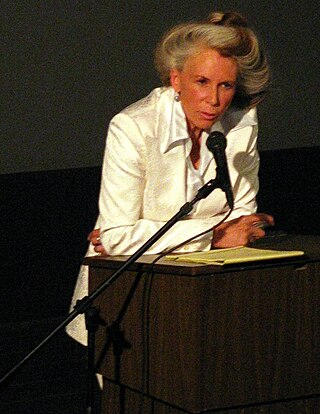Feminism is a range of socio-political movements and ideologies that aim to define and establish the political, economic, personal, and social equality of the sexes. Feminism holds the position that societies prioritize the male point of view and that women are treated unjustly in these societies. Efforts to change this include fighting against gender stereotypes and improving educational, professional, and interpersonal opportunities and outcomes for women.
Radical feminism is a perspective within feminism that calls for a radical re-ordering of society in which male supremacy is eliminated in all social and economic contexts, while recognizing that women's experiences are also affected by other social divisions such as in race, class, and sexual orientation. The ideology and movement emerged in the 1960s.
Difference feminism is a term developed during the equality-versus-difference debate in American feminism to describe the view that men and women are different, but that no value judgment can be placed upon them and both sexes have equal moral status as persons.
Liberal feminism, also called mainstream feminism, is a main branch of feminism defined by its focus on achieving gender equality through political and legal reform within the framework of liberal democracy and informed by a human rights perspective. It is often considered culturally progressive and economically center-right to center-left. As the oldest of the "Big Three" schools of feminist thought, liberal feminism has its roots in 19th century first-wave feminism seeking recognition of women as equal citizens, focusing particularly on women's suffrage and access to education, the effort associated with 19th century liberalism and progressivism. Liberal feminism "works within the structure of mainstream society to integrate women into that structure." Liberal feminism places great emphasis on the public world, especially laws, political institutions, education and working life, and considers the denial of equal legal and political rights as the main obstacle to equality. As such liberal feminists have worked to bring women into the political mainstream. Liberal feminism is inclusive and socially progressive, while broadly supporting existing institutions of power in liberal democratic societies, and is associated with centrism and reformism. Liberal feminism tends to be adopted by white middle-class women who do not disagree with the current social structure; Zhang and Rios found that liberal feminism with its focus on equality is viewed as the dominant and "default" form of feminism. Liberal feminism actively supports men's involvement in feminism and both women and men have always been active participants in the movement; progressive men had an important role alongside women in the struggle for equal political rights since the movement was launched in the 19th century.

Catharine Alice MacKinnon is an American feminist legal scholar, activist, and author. She is the Elizabeth A. Long Professor of Law at the University of Michigan Law School, where she has been tenured since 1990, and the James Barr Ames Visiting Professor of Law at Harvard Law School. From 2008 to 2012, she was the special gender adviser to the Prosecutor of the International Criminal Court.
Feminist legal theory, also known as feminist jurisprudence, is based on the belief that the law has been fundamental in women's historical subordination. Feminist jurisprudence the philosophy of law is based on the political, economic, and social inequality of the sexes and feminist legal theory is the encompassment of law and theory connected.The project of feminist legal theory is twofold. First, feminist jurisprudence seeks to explain ways in which the law played a role in women's former subordinate status. Feminist legal theory was directly created to recognize and combat the legal system built primarily by the and for male intentions, often forgetting important components and experiences women and marginalized communities face. The law perpetuates a male valued system at the expense of female values. Through making sure all people have access to participate in legal systems as professionals to combating cases in constitutional and discriminatory law, feminist legal theory is utilized for it all.
Susan Moller Okin was a liberal feminist political philosopher and author.
Drucilla Cornell, was an American philosopher and feminist theorist, whose work has been influential in political and legal philosophy, ethics, deconstruction, critical theory, and feminism. Cornell was an emerita Professor of Political Science, Comparative Literature and Women's & Gender Studies at Rutgers University the State University of New Jersey; Professor Extraordinaire at the University of Pretoria, South Africa; and a visiting professor at Birkbeck College, University of London. She also taught for many years on the law faculties of the University of Pennsylvania and of Cardozo Law School of Yeshiva University.
Martha Albertson Fineman is an American jurist, legal theorist and political philosopher. She is Robert W. Woodruff Professor of Law at Emory University School of Law. Fineman was previously the first holder of the Dorothea S. Clarke Professor of Feminist Jurisprudence at Cornell Law School. She held the Maurice T. Moore Professorship at Columbia Law School.
Equity feminism is a form of liberal feminism that advocates the state's equal treatment of women and men without challenging inequalities perpetuated by employers, educational and religious institutions, and other elements of society. The concept has been discussed since the 1980s. Equity feminism has been defined and classified as a kind of classically liberal or libertarian feminism, in contrast with social feminism, difference feminism, gender feminism, and equality feminism.
Feminist views on pornography range from total condemnation of the medium as an inherent form of violence against women to an embracing of some forms as a medium of feminist expression. This debate reflects larger concerns surrounding feminist views on sexuality, and is closely related to those on prostitution, BDSM, and other issues. Pornography has been one of the most divisive issues in feminism, particularly in Anglophone (English-speaking) countries. This division was exemplified in the feminist sex wars of the 1980s, which pitted anti-pornography activists against pro-pornography ones.
Feminism is one theory of the political, economic, and social equality of the sexes, even though many feminist movements and ideologies differ on exactly which claims and strategies are vital and justifiable to achieve equality.
Feminist political theory is an area of philosophy that focuses on understanding and critiquing the way political philosophy is usually construed and on articulating how political theory might be reconstructed in a way that advances feminist concerns. Feminist political theory combines aspects of both feminist theory and political theory in order to take a feminist approach to traditional questions within political philosophy.

Toward a Feminist Theory of the State is a 1989 book about feminist political theory by the legal scholar Catharine MacKinnon.

Ann C. Scales was an American lawyer, activist, and law professor at the University of Denver Sturm College of Law from 2003 to 2012, where she taught in constitutional law, sexual orientation and the law, civil procedure and torts.
Feminist views on sexuality widely vary. Many feminists, particularly radical feminists, are highly critical of what they see as sexual objectification and sexual exploitation in the media and society. Radical feminists are often opposed to the sex industry, including opposition to prostitution and pornography. Other feminists define themselves as sex-positive feminists and believe that a wide variety of expressions of female sexuality can be empowering to women when they are freely chosen. Some feminists support efforts to reform the sex industry to become less sexist, such as the feminist pornography movement.
Laurie J. Shrage is an American political and moral philosopher whose analysis of the agendas for social change advanced by gender and sexual dissidents has been influential.
Janet Elizabeth Halley is an American legal scholar who is the Eli Goldston Professor of Law at Harvard Law School. Her work is influenced by critical legal studies, legal realism and postmodernism.
Linda McClain is the Robert B. Kent Professor of Law at Boston University School of Law, and was previously the Rivkin Radler Distinguished Professor of Law at Hofstra Law School. McClain's work focuses on family law, sex equality, and feminist legal theory. McClain has written extensively on topics related to family, gender, and constitutional issues.

Feminist perspectives on sex markets vary widely, depending on the type of feminism being applied. The sex market is defined as the system of supply and demand which is generated by the existence of sex work as a commodity. The sex market can further be segregated into the direct sex market, which mainly applies to prostitution, and the indirect sex market, which applies to sexual businesses which provide services such as lap dancing. The final component of the sex market lies in the production and selling of pornography. With the distinctions between feminist perspectives, there are many documented instances from feminist authors of both explicit and implied feminist standpoints that provide coverage on the sex market in regards to both "autonomous" and "non-autonomous" sex trades. The quotations are added since some feminist ideologies believe the commodification of women's bodies is never autonomous and therefore subversive or misleading by terminology.




